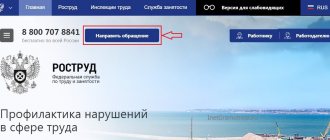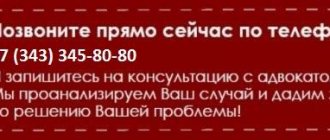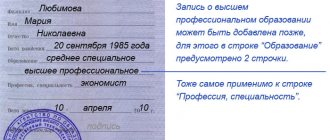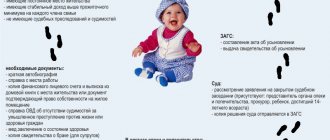Every person is guaranteed protection of labor rights. This is how the constitutional right to work is realized. For one person, this requires active action; for another, the guarantees established by law are sufficient.
The Labor Code is mainly filled with regulations containing the conditions and requirements necessary for labor protection and protection of employee rights. Therefore, protecting the labor rights of the parties to a labor agreement is the primary responsibility of the state, which is carried out in various ways.
Ways to protect labor rights
According to labor legislation, the main ways to protect the rights of workers are:
- state control (supervision) over compliance with labor legislation;
- protection of labor rights by trade unions;
- independent protection by employees of their labor rights;
- protection of labor rights in the courts.
Other, not prohibited by law, methods of protecting labor rights are also permitted. But the above list is sufficient for competent behavior in labor relations.
Which organization protects the interests of workers?
Many employees are interested in the name of the organization that protects workers' rights.
There are several such authorities. Firstly, the State Labor Inspectorate is responsible for resolving labor disputes and protecting the interests and rights of employees. It represents a single centralized system, which consists of a federal government authority, as well as territorial structures.
Secondly, trade union committees and courts at various levels are involved in the protection of rights. Each of these bodies has its own functions and responsibilities.
Protection of labor rights by government agencies
State control (supervision) over compliance with labor legislation is assigned to the State Labor Inspectorate. The procedure for the inspection's activities is determined by the Government of the Russian Federation. A form of supervisory and control activity is inspection, carried out on behalf of Rostrud and structural divisions of the Ministry of Labor of the Russian Federation.
Along with this, the control function in certain areas of activity is assigned to the federal executive authorities. For example, the functions of the Ministry of Labor and Social Protection of the Russian Federation are to implement state policy in the field of labor, remuneration, labor protection, and so on. The functions of the department for organizing sanitary supervision of occupational hygiene, which is part of the structure of Rospotrebnadzor, is to check employers for compliance with the requirements of sanitary legislation.
The prosecutor's office also belongs to the regulatory authorities. The prosecutor checks information about violations of human rights, explains the procedure for protecting rights, takes the necessary measures to suppress violations of human rights, including carrying out a prosecutorial check on compliance with labor protection of workers.
To initiate an inspection against an employer, an employee can use a complaint to the labor inspectorate, the prosecutor's office, Rospotrebnadzor, or other government bodies. You will find examples and recommendations for drawing up such documents on the website.
Labour Inspectorate
The State Labor Inspectorate is a government body that monitors compliance with labor legislation. Labor inspection departments operate in all regions and are available to all citizens who need the protection of labor rights.
The labor inspectorate works on complaints from citizens. The functions of the inspectorate include monitoring the implementation of labor legislation. The inspectorate can implement the protection of labor rights by:
- carrying out inspections
- performing examinations
- issuing orders
- drawing up protocols on administrative offenses
- imposing fines
The labor inspectorate can only control those employment relationships that are ongoing. Disputes regarding dismissal or violations in former labor relations are not within its competence.
The most effective way is to contact the labor inspectorate with complaints about the actions of individual entrepreneurs. The main thing is that the employment contract is drawn up properly.
How to properly file a complaint
Regardless of where you plan to file a complaint against your employer, you must competently draw up a complaint or statement of claim. In addition to the applicant’s data, these documents must detail what, in the applicant’s opinion, was a violation of his rights by the employer, and which articles of the Labor Code were violated. The stated facts must be confirmed, the documents are listed in the complaint, and their copies are attached to it as evidence.
You can draw up an appeal or statement yourself, using samples on the official websites of government agencies or in legal reference systems. If you have doubts about the level of your own knowledge, it is advisable to use the help of professional lawyers and specialists in the field of labor law.
Protection of labor rights by trade unions
Trade unions defend the rights and interests of trade union members on individual issues of labor relations, and when protecting collective rights, regardless of trade union membership when vested with powers to represent interests.
To protect employee rights, trade unions have the following rights:
- make proposals for the adoption of laws and other regulations regarding the social and labor sphere by the relevant state authorities;
- provide an opinion on drafts of such acts;
- take part in agreeing with employers on wages, payment systems and labor standards;
- freely visit the workplaces of trade union members.
In addition, as advocates, trade unions:
- participate in the development of state employment programs;
- exercise control in the field of employment;
- evaluate the employer’s actions when terminating an employment contract on his initiative and, in certain cases, agree to terminate the agreement;
- exercise control over compliance with legislation.
It is necessary to note that to monitor compliance with labor laws, trade unions have the right to involve state regulatory authorities.
Based on the law, trade unions have the right to demand that the employer eliminate violations. Moreover, within seven days from the receipt of the request, the employer must inform the trade union about the results of eliminating the violations.
Historical reference
The first trade unions began to emerge in the 18th century in England, during the years of the “industrial revolution”. This was quite natural, since England was at that moment the most developed country in the world.
It should be noted that the first workers' associations were strictly local in nature and united only highly qualified workers in the most popular and advanced industries. As for unskilled workers, high unemployment made them easily replaceable, so at first they could not resist the arbitrariness of employers and remained outside the scope of the trade union movement.
The formation of trade unions in Russia
In Russia, trade unions appeared much later than in other countries. This was due to the fact that for a long time it remained an agrarian state, where industry was not developed and small-scale production existed. Only with the development of large-scale factory production and the formation of the working class were the prerequisites created for the emergence of organizations defending the interests of workers. Just as in other countries, mutual aid funds and partnerships for economic support of each other are initially created.
After the collapse of the USSR, the trade union movement suffered a number of changes; the Federation of Independent Trade Unions of Russia was formed, uniting the majority of Russian sectoral and territorial trade unions and trade unions. Currently, the latter includes 122 member organizations, including 40 all-Russian (interregional) trade unions, uniting 20 million people.
Independent protection of labor rights
Self-defense of labor rights is the active actions of workers aimed at protecting their lives, health and labor rights, with or without contacting government control (supervision) bodies for compliance with labor legislation.
In fact, the Labor Code defines only one method of self-defense - refusal to perform work. However, this method of protection should not be confused with a strike, since it is carried out with the aim of protecting individual labor rights.
The main methods of self-protection are identified:
- refusal to perform work not provided for in the employment contract;
- refusal to perform dangerous work;
- other cases of refusal provided for by the labor legislation of the Russian Federation (refusal of a business trip, transfer of annual leave, etc.);
- suspension of work for late payment of wages.
Self-defense of rights does not require official registration and the involvement of state supervisory authorities. In addition, it is allowed to use self-defense with another method of protecting rights at the same time.
Using the right to self-defense, an employee cannot be brought to administrative or disciplinary liability.
Article 375. Guarantees for released trade union workers
(as amended by Federal Law No. 90-FZ of June 30, 2006)
An employee who is released from work in an organization or an individual entrepreneur in connection with his election to an elective position in the elective body of a primary trade union organization (hereinafter also referred to as a released trade union employee), after the end of his term of office, is given his previous job (position), and in the absence of it with the written consent of the employee, another equivalent job (position) with the same employer. If it is impossible to provide the specified work (position) due to the liquidation of the organization or the termination of activities by an individual entrepreneur or the absence of the corresponding work (position) in the organization, the all-Russian (interregional) trade union retains for this employee his average earnings for the period of employment, but not over six months, and in case of study or retraining - for a period of up to one year. If an employee refuses the proposed corresponding job (position), his average earnings for the period of employment are not retained, unless otherwise established by a decision of the all-Russian (interregional) trade union.
The time an exempt trade union worker works in an elective position in the elected body of the primary trade union organization is counted towards his general and special work experience.
Released trade union workers have the same labor rights, guarantees and benefits as employees of an organization or individual entrepreneur in accordance with the collective agreement.
Protection of labor rights in the courts
In order to restore violated rights, an employee may go to court. Today, this method of protecting rights is the most effective. After all, a court decision in a civil case is binding. However, the time limit for going to court is limited to 3 months, and for dismissals - 1 month.
In addition to the judicial authorities, depending on the violated right, the employee has the right to apply to the commission for social and labor relations, labor disputes and labor arbitration
In fact, legislation provides significant opportunities to protect labor rights. Unfortunately, a significant portion of employees do not know or understand how best to take advantage of the opportunities provided. Although almost any problem in labor relations can be resolved in favor of the employee. This is evidenced by judicial practice in claims for reinstatement at work, recovery of wages, etc. It is more difficult with the evidence base for claims about the conclusion of an employment contract, about establishing the fact of labor relations.
The protection of labor rights depends entirely on the active actions and initiative of the employee.
What should a person do if an employer violates his rights?
If an employee believes that his rights have been violated, then he needs to understand whether the manager’s actions are illegal.
Next, you need to decide how to restore justice. First, you should talk to your superiors about the infringement of personal rights and freedoms. It is important to refer to the provisions of labor legislation. If this does not lead to anything, then you need to contact the government agency that protects the interests of workers. It is not recommended to use self-defense methods, especially if there is no successful practice of such actions.
To understand where to file a complaint, it is necessary to analyze the nature of the violation. It is important to collect a good evidence base. The success of the business depends on this. Therefore, it is important for employees to know their rights and responsibilities as an employer.
If the head of a company commits actions that do not fall within the framework of labor legislation, then he can be held accountable. To do this, you need to choose the optimal method and form of protecting personal rights, and the organization to which to draw up and submit a complaint. The success of resolving a conflict largely depends on the employee’s activity, his desire to defend his interests, as well as the availability of a good evidence base.
Subscribe to the latest news








